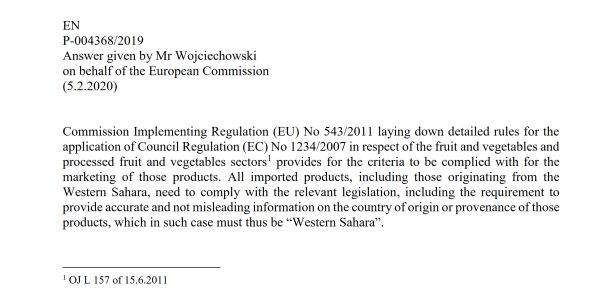
“I think this incident should alert people about these EU-Morocco trade negotiations on products from Western Sahara: they are not transparent at all”, says Jytte Guteland, socialist Euro-parliamentarian from Sweden.
Friday, 27th October 2017, five Members of the European Parliament (MEPs) were denied entry to El Aaiun, Western Sahara, by the Moroccan authorities. The MEPs were not allowed to leave the plane, and were subsequently flown back to Europe.
All five deported MEPs are members of the European Parliament’s Intergroup for Western Sahara. The program for their visit included meetings with civil society representatives in El Aaiun, in order to assess the situation on the ground and the EU’s influence on the conflict dynamics.
The European Commission is currently engaged in talks with Morocco in order to amend the agricultural protocols of the EU-Morocco Association Agreement. The talks were triggered by the judgment of the EU’s Court of Justice of 21 December 2016, stipulating that Western Sahara and Morocco are two distinct and separate territories and that as such, no agreement with Morocco can be applied to Western Sahara without the consent of the people of the territory.
The MEPs who were denied entry to Western Sahara are: Mrs Jytte Guteland (Sweden, S&D), Mr Bodil Valero (Sweden, Greens/EFA), Mrs Paloma López Bermejo (Spain, GUE/NGL), Mrs Lídia Senra (Spain, GUE/NGL) and Mr Josu Juaristi (Spain, GUE/NGL).
WSRW had the exclusive opportunity to interview Jytte Guteland, the Chair of the Western Sahara Intergroup of the European Parliament.
WSRW: Could you please tell us what happened? Were you still in the plane when the Moroccan authorities came?
MEP Guteland: When we landed in El Aaiun, someone entered the plane with the list of the passengers, and pointed at some names. Some people were allowed to disembark, then other people left and in the end, we were the only people left on the plane: 5 MEPs and 1 other person of our team.
The authorities told us “we were not welcome to leave the plane”. The Moroccan authorities do not want politicians, journalists, etc. in Western Sahara. We got new boarding passes and we left. I thought their behavior was very impolite and somehow embarrassing.
I think it is very natural for us, as MEPs, to visit Western Sahara, since we will take a position on the amendment to include Western Sahara in the EU-Morocco Association Agreement and on the ongoing negotiations between the two parties.
We need information and it was very weird that we could not leave the plane. We went there to find out more about organizations, civil society, etc. We need information if we are to vote on the proposed amendment to the Agreement!
I have invited the Moroccan authorities in Brussels to share their views with us. And now, I think it is time to meet the Saharawi people. It is important for European authorities to understand what they think, also because there is not enough information and data about this proposed modification of the agreement, its effects and the amount of trade concerned.
WSRW : Why do you think Moroccan authorities refused to allow you in?
MEP Guteland: I wonder about that myself: if you do not have anything to hide, why don’t you allow MEPs to enter? It should be in their interest to let us in and to be more polite with us. They are not there in their right; it’s not a Moroccan territory. We went there to find information and we have been rejected.
WSRW: Have you contacted the EU Delegation in Morocco? If so, what was their reaction?
MEP Guteland: No, I have not. We left the country by plane immediately after the incident. I am going to invite the Moroccan Ambassador to the European Parliament and ask him for an explanation. I will ask to the Ambassador to come to my office and explain to me why they did not let us in. I found it very weird and impolite.
WSRW : Do you think this incident will affect the ongoing negotiations or not?
MEP Guteland: I think this incident should alert people about these EU-Morocco trade negotiations on products from Western Sahara: they are not transparent at all. I think what happened last weekend will help to make all of us aware of these negotiations, which are not open. We have to comply with the CJEU ruling of 21.12.2016, it is necessary to respect the EU law.
WSRW: How will the Western Sahara Intergroup proceed, following your expulsion?
MEP Guteland: We are going to try our best to raise more awareness in the Parliament. The Parliament needs to have all the information pertaining to the agreement in order to respect the CJEU ruling.
WSRW: What has been the reaction of your political group, the Socialists and Democrats, to your expulsion? In particular, considering the relevant role of the S&D group and its attention to this issue - we recall the statement published on the S&D website the day after the CJEU ruling.
MEP Guteland: No reaction yet. We informed Pittella (S&D President, ndr) about the trip and I will submit a report to the group. So far, no reaction, but some colleagues have called me to show me their support. It is a shame that we were not allowed to enter the country. I am sure there will be a follow- up to the incident, both in the European Parliament and in the S&D group.
WSRW: According to our sources, some MEPs of the EP Trade committee’s monitoring group on trade with Morocco/Western Sahara would like to do a fact-finding mission in WS, but others prevent them to do so, notably in order to avoid what you’ve just experienced. Do you think Morocco will deny entry also to MEPs from the Trade committee?
MEP Guteland: I do not know if the Moroccan authorities would welcome MEPs of the Trade Committee’s Monitoring Group. All of us in the Parliament need to find out more about the trade. I think it is not logical to welcome some MEPs and reject others. They should welcome them (Trade Committee) as they should welcome us.
WSRW: Do you think the EU is afraid of disappointing Morocco? We are all aware of the major role played by the kingdom in terms of counterterrorism, anti-migration, stability in the Maghreb region, etc. Nonetheless, what just happened is surprising: how can the EU accept to have its MEPs stopped by the authorities of a friendly country?
MEP Guteland: My view is that the EU has to respect the ruling of the court. If not, I wonder why. I must believe that the EU will respect the ruling and I must put pressure in order for this to happen. I think it will be a failure for the EU not to do act in line with what the Court has dictated, but I am nevertheless expecting the EU to comply with the CJEU ruling.
WSRW: The CJEU ruling refers to the need to seek the consent of the "people" of Western Sahara, i.e. the Saharawis and not that of the "(local) population", which includes a much larger number of Moroccan settlers. However, according to some rumors, the Commission would be seeking the consent of the local population, not of the people. If that is indeed the case, what will be the response of the WS Intergroup?
MEP Guteland: The Intergroup is aware that the Commission is trying to circumvent the ruling. For many of the members of the EP, it is crucial that we will have the people of WS represented in the negotiations. It is not acceptable for me that the Commission is at present negotiating with just Morocco. We have been very clear that we want to fully respect the judgment. If this would not happen, it will only prolong the conflict and the uncertainty, and will increase the legal risks.
WSRW: Your party, the Swedish Social Democrats, is in government in Sweden. What is the position of your government regarding the ongoing trade negotiations concerning Western Sahara? What are the conditions for your government to vote in favor of this agreement?
MEP Guteland: I believe that they said they want to respect the law. It is essential for our government to respect the law. We will see what is going to happen, it is not absolutely clear yet, but the Swedish government wants the EU to respect the CJEU ruling.
WSRW: You’ve changed your vote from abstention to no on the Aviation Agreement. In this regard, isn’t it ironic that you and other MEPs have been barred from departing a plane right after the Parliament approved the aviation agreement? What is the point of including Western Sahara in the geographical scope of this agreement if EU lawmakers themselves cannot travel to the territory by plane?
MEP Guteland: That is a good question. I wanted to change my vote, to have a minus and not to abstain because the Commission is not answering the questions. I changed it after because it was clear that the Commission does not have the intention to clarify the situation. They do not want to explain us how the Aviation Agreement can be in line with the CJEU ruling. Yes, it is really ironic, I totally agree.
EU Commission backtracks on labelling Western Sahara goods
What is EU's position on labelling of products from occupied Western Sahara? The EU Commission has now for the third time published a response to a parliamentary question on the matter, but the latest version fails to address the question.
EU Parliament set for blind landing of aviation deal
Tomorrow, the European Parliament is scheduled to vote on an amendment to the EU-Morocco Aviation Agreement - without any clarifications from the EU Commission as to how the proposal aligns with the 2018 Ruling of EU Court of Justice, invalidating the application of that very Agreement to Western Sahara.
Update: the European Parliament has postponed all votes scheduled to take place on 10 March to a later date, due to the COVID-19-crisis.
Why does this EU statement keep disappearing?
A clarification by the EU Commission on labelling of products from Western Sahara was published, then removed, then published again and has now been removed again from EU websites.
EU reaffirms: Western Sahara products to be labelled as such
Two weeks ago, the EU Commission announced that products from Western Sahara should be labelled accordingly, only to withdraw that statement the very next day. Today, the Commission reaffirms its original position.



